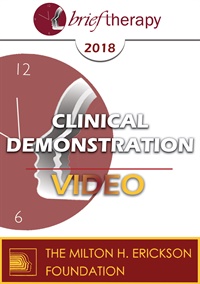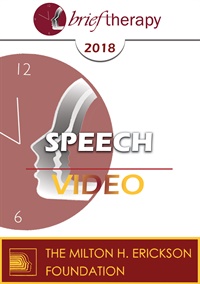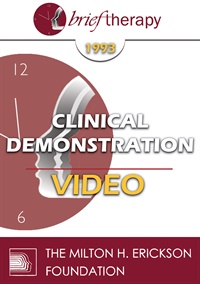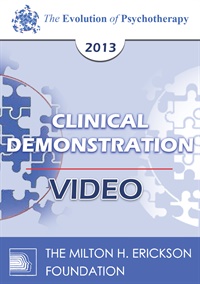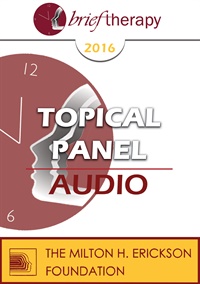
- Average Rating:
- Not yet rated
- Topic Areas:
- Topical Panels | Brief Therapy | Resources | Therapeutic Relationship
- Categories:
- Brief Therapy Conference | Brief Therapy Conference 2016
- Faculty:
- A. Steven Frankel, PhD, JD, ABPP | Scott Miller, PhD | Ronald Siegel, PsyD | Michael Yapko, PhD
- Duration:
- 1:01:03
- Format:
- Audio Only
- Original Program Date:
- Dec 10, 2016
- Short Description:
- BT16 Topical Panel 1 - Client Resources Therapist Resources - Steve Frankel, Scott Miller, Ron Siegel, and Michael Yapko Topical Panel on Client Resource Therapist Resources
- Price:
- $15.00 - Base Price
Credit available - Click Here for more information
- Average Rating:
- Not yet rated
- Topic Areas:
- Clinical Demonstrations | Belief Systems | Brief Therapy | Resources
- Categories:
- Brief Therapy Conference | Brief Therapy Conference 2018 | Online Continuing Education
- Faculty:
- Robert Dilts, BA
- Course Levels:
- Master Degree or Higher in Health-Related Field
- Duration:
- 1:00:44
- Format:
- Audio and Video
- Original Program Date:
- Dec 08, 2018
- Short Description:
- "Belief barriers" are beliefs or assumptions that interfere with or undermine our motivation and progress toward the successful achievement of our goals. Many such barriers will emerge for clients during brief therapy. Therapists need to have the skill to create “belief bridges” that get over or bypass limiting beliefs and belief barriers, and ultimately create the possibility to transform them. This demonstration will show how to identify a belief barrier and help create a "belief bridge" that reconnects the client to key resources and shifts their focus to a broader perspective.
- Price:
-
Sale is $29.00
price reduced from Base Price - $59.00
Credit available - Click Here for more information
- Average Rating:
- Not yet rated
- Topic Areas:
- Clinical Demonstrations | Hypnosis | Resources | Experiential Therapy | Suggestion | Brief Therapy
- Categories:
- Brief Therapy Conference | Brief Therapy Conference 2018 | Online Continuing Education
- Faculty:
- Michael Yapko, PhD
- Course Levels:
- Master Degree or Higher in Health-Related Field
- Duration:
- 57:31
- Format:
- Audio and Video
- Original Program Date:
- Dec 08, 2018
- Short Description:
- Hypnosis is an experiential vehicle for helping people discover and use their personal strengths or resources in helpful ways. Hypnosis also helps people develop new perspectives and understandings that can lead to better choices and a greater sense of personal empowerment. In this demonstration, we will apply principles and methods of hypnosis in the service of achieving the client's therapeutic objective.
- Price:
-
Sale is $29.00
price reduced from Base Price - $59.00
Credit available - Click Here for more information
- Average Rating:
- Not yet rated
- Topic Areas:
- Speeches | Psychotherapy | Art and Creativity | Brief Therapy | Resources
- Categories:
- Brief Therapy Conference | Brief Therapy Conference 2018 | Online Continuing Education
- Faculty:
- Stephen Gilligan, PhD
- Course Levels:
- Master Degree or Higher in Health-Related Field
- Duration:
- 1:01:12
- Format:
- Audio and Video
- Original Program Date:
- Dec 09, 2018
- Short Description:
- Therapy is successful when clients are able to experience significantly changed realities. While the identification and transformation of symptoms is important in this regard, the activation of the client's creative capacity to make positive changes is even more important. This paper will explore how the 6-step model of Generative Psychotherapy provides a disciplined yet flexible process for helping clients claim and use their agency for creative change.
- Price:
-
Sale is $29.00
price reduced from Base Price - $59.00
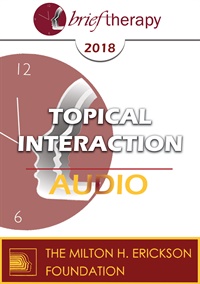
- Average Rating:
- Not yet rated
- Topic Areas:
- Topical Interactions | Brief Therapy | Communication | Evocative Communication | Resources
- Categories:
- Brief Therapy Conference | Brief Therapy Conference 2018
- Faculty:
- Bill O'Hanlon, MS
- Duration:
- 53:03
- Format:
- Audio Only
- Original Program Date:
- Dec 08, 2018
- Short Description:
- What can brief therapy work? In this session, Bill O'Hanlon will make the case that it involves evocation of already existing resources, so the client doesn't have to be fixed, taught new skills or make major changed to resolve problems.
- Price:
- $15.00 - Base Price
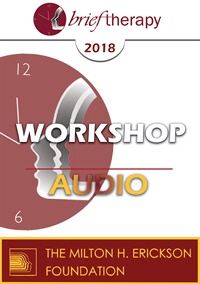
- Average Rating:
- Not yet rated
- Topic Areas:
- Workshops | Couples Therapy | Hypnosis | Trance | Family Therapy | Brief Therapy | Resources | Resistance
- Categories:
- Brief Therapy Conference | Brief Therapy Conference 2018
- Faculty:
- Camillo Loriedo, MD, PhD
- Duration:
- 1:58:55
- Format:
- Audio Only
- Original Program Date:
- Dec 07, 2018
- Short Description:
- Hypnosis will be presented within a system perspective, as a circular and evolving process, while couples and families will be considered as a source of natural healing resources that the therapist should discover and activate. Specific direct and indirect techniques required to induce a deep and meaningful change of the most rigid family patterns will be introduced. The demonstration of a family hypnotic session will give a clear idea of the powerful and subtle resistances families can develop in the course of the hypnotic treatment as well as of how naturalistic systemic hypnosis can transform these resistances in the required solutions.
- Price:
- $15.00 - Base Price
- Average Rating:
- Not yet rated
- Topic Areas:
- Clinical Demonstrations | Hypnosis | Resources
- Categories:
- Brief Therapy Conference | Brief Therapy Conference 1993
- Faculty:
- Michael Yapko, PhD
- Course Levels:
- Master Degree or Higher in Health-Related Field
- Duration:
- 51:14
- Format:
- Audio and Video
- Original Program Date:
- Dec 11, 1993
- Short Description:
- Educational Objectives: To view the various styles of Brief Therapy and to be able to apply techniques in given clinical situations.
- Price:
-
Sale is $29.00
price reduced from Base Price - $59.00
- Average Rating:
- Not yet rated
- Topic Areas:
- Clinical Demonstrations | Resources | Psychotherapy
- Categories:
- Evolution of Psychotherapy | Evolution of Psychotherapy 2013
- Faculty:
- Robert Dilts, BA
- Course Levels:
- Master Degree or Higher in Health-Related Field
- Duration:
- 1:02:04
- Format:
- Audio and Video
- Original Program Date:
- Dec 13, 2013
- Short Description:
- This demonstration will show how to bring the positive forms of the “archetypal energies” of strength, softness and playfulness into a challenging situation in order to explore what other choices they make possible.
- Price:
-
Sale is $29.00
price reduced from Base Price - $59.00
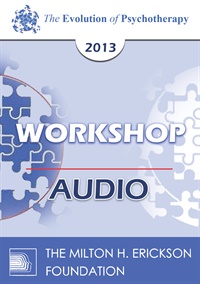
EP13 Workshop 25 – The Three Positive Connections Needed for Creative Change – Stephen Gilligan, PhD
- Average Rating:
- Not yet rated
- Topic Areas:
- Workshops | Goals of the Therapist | Psychotherapy | Resources | Somatic Experiences
- Categories:
- Evolution of Psychotherapy | Evolution of Psychotherapy 2013
- Faculty:
- Stephen Gilligan, PhD
- Duration:
- 2 Hours 39 Minutes
- Format:
- Audio Only
- Original Program Date:
- Dec 12, 2013
- Short Description:
- Psychotherapy is an exploration of how individuals can forge positive, therapeutic responses to life challenges. This workshop focuses on the three core connections that allow clients to do this: (1) Positive intention and goals (“towards a positive future”); (2) Somatic Centering (“embodied presence”); and (3) Field Resources (“positive connections beyond the problem”). We will see how in a repetitive problem, all three of these connections are typically absent. More importantly, we will see how clients may be helped to developed and sustain these positive connections while engaging with challenging material—e.g., a past trauma, a present difficulty, or a future possibility. Participants will be offered multiple techniques and examples, as well as several demonstrations to illustrate this positive orientation to psychotherapy.
- Price:
- $15.00 - Base Price

- Average Rating:
- Not yet rated
- Topic Areas:
- Psychotherapy | Workshops | Generative Psychotherapy | Ericksonian Psychotherapy | Self-Relations | Resources
- Categories:
- Evolution of Psychotherapy | Evolution of Psychotherapy 2013
- Faculty:
- Stephen Gilligan, PhD
- Duration:
- 2 Hours 42 Minutes
- Format:
- Audio Only
- Original Program Date:
- Dec 14, 2013
- Short Description:
- This workshop presents the Ericksonian and Self-Relations Psychotherapy approach to human states of suffering: depression, anxiety, trauma, addiction, etc. This practical and positive approach assumes that each core human experience has equivalent potential to be positive or negative, depending on the human relationship to it; and thus focuses on how problems can be transformed into resources by skillful human connection. This process operates at two levels: (1) developing a generative state (in the therapist, client, and relationship field) and then (2) using specific methods of transforming negative experiences and behaviors.
- Price:
- $15.00 - Base Price
Please wait ...


